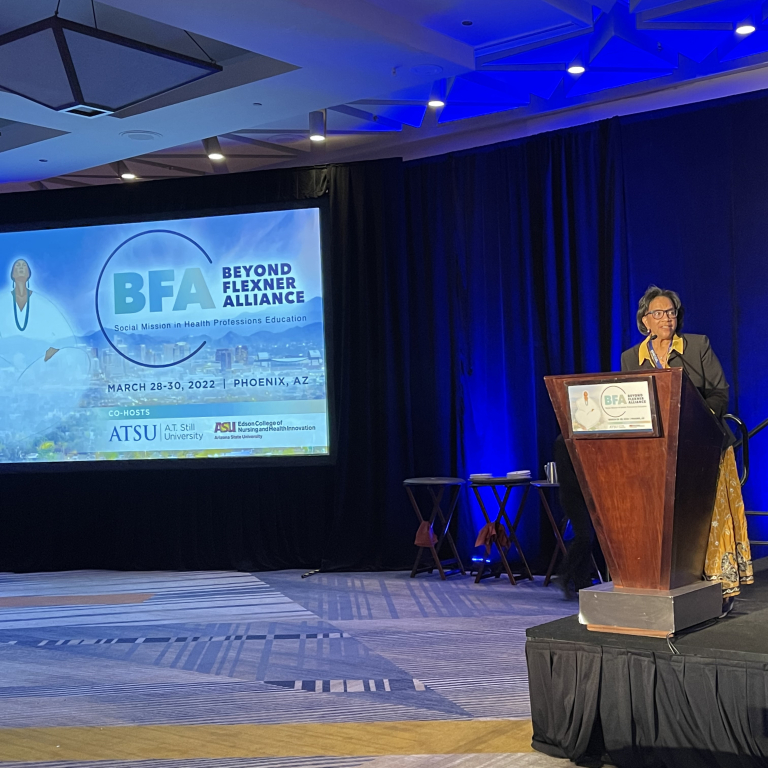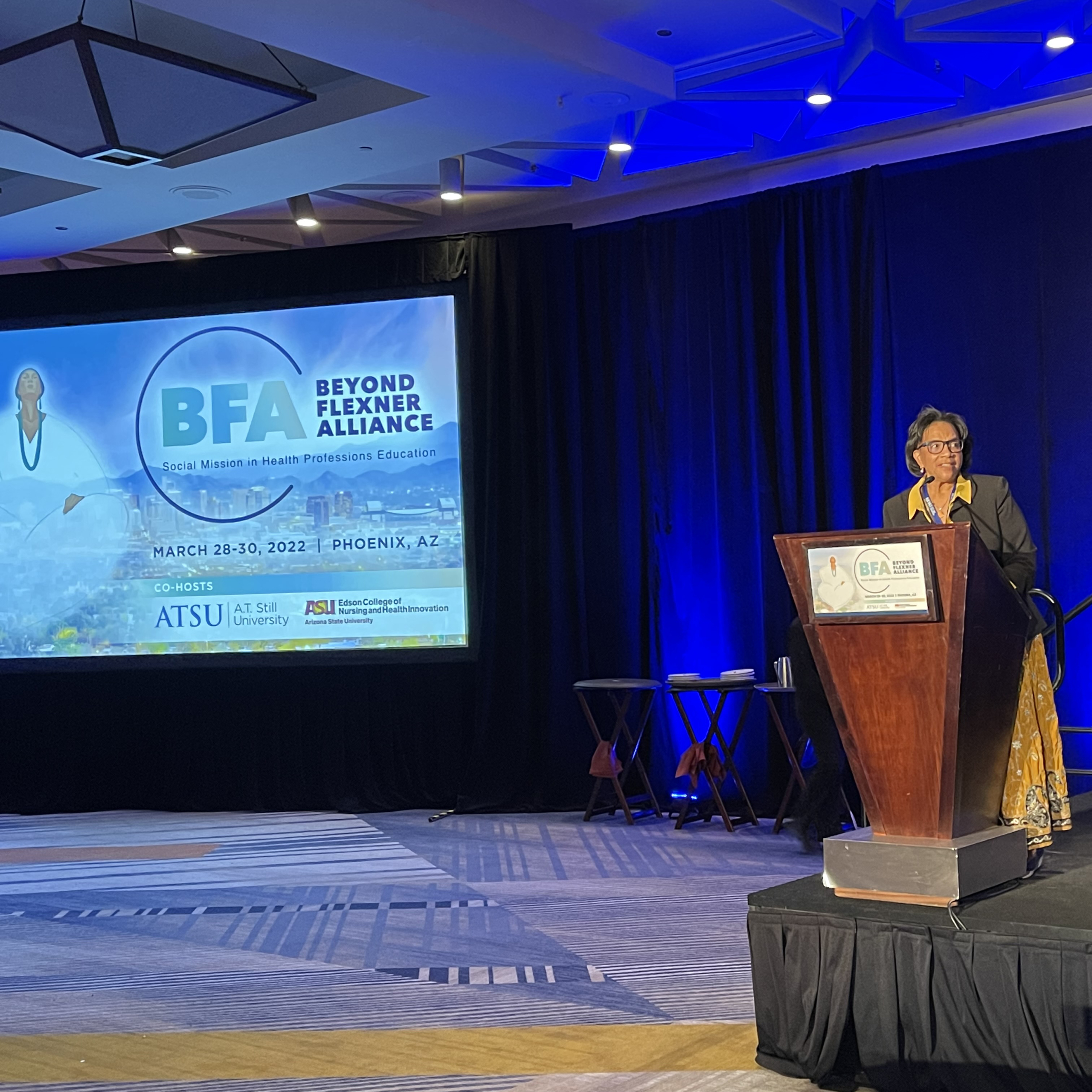Beyond Flexner Conference begins with powerful messages on health equity, social justice
Posted: March 28, 2022
With powerful messages on the future of health professions education advancing health equity and social justice, the 2022 Beyond Flexner Conference, co-hosted by A.T. Still University (ATSU) and Arizona State University’s (ASU) Edson College of Nursing and Health Innovation, began Monday at the Hyatt Regency in Phoenix.
This year’s interprofessional forum is titled, “Moving the dial on social mission: Ensuring health professions education meets the challenges of today.” The three-day event will feature keynote speeches and breakout sessions, gathering leaders with a goal to bring about meaningful change.
Read below for highlights from Day 1. For a complete schedule of conference speakers and sessions, visit flexnerconference.org/program.
Jamar Slocum, MD, MBA, MPH, George Washington University, on changes necessitated by the COVID-19 pandemic…
“Our last year has been filled with uncertainty, loss, challenges. None of our infrastructures – both government and medical – were built around the collective reasoning that would prepare us to communicate effectively, or to have a strategy in place to mitigate some of the fears we have. Myself and many others aspire to this ‘new normal,’ but really, are we ever going to get back to a ‘new normal’? It’s a paradigm shift. We have to rethink our everyday lives, but necessity is the mother of invention.”
Dougherty Tsalabutie, MPH, director, National Center for American Indian Health Professions, A.T. Still University, providing welcome remarks, land acknowledgement, and goals for conference attendees…
“We commit to…identify and address challenges, and organize to advocate for meaningful change by, A) improving outcomes in communities we serve through mission recruitment, education curriculum, clinical service, and research; B) addressing structural racism and privilege to advance equity, including, and belonging in health professions education; C) developing initiatives to address global health equity and social justice, particularly for those impacted by COVID-19; D) advance measures, data, research, funding, and standards to address meaningful change; and E) identifying and advocating for policies to advance social mission and change meaningful policies into practice.”
Toyese Oyeyemi, MPH, MCHES, director, Beyond Flexner Alliance, on key questions facing conference attendees…
“What if we modernized the standard of health professions education? What if the socially accountable nursing school and the socially accountable medical school and the socially accountable dental school were the norm for how we recruit and train and support learners, and how we engage community priorities, and how we address social determinants of health, and how we distribute a workforce for communities of highest need?”
Candice Chen, MD, MPH, associate professor of Health Policy and Management, Milken Institute School of Public Health, on the value of breakout sessions…
“One of my favorite things about the conference are the breakout sessions, where you all share the work you’re doing every day, on the ground, to center community in education, to advance primary care, to advance healthcare for rural and underserved America, to dismantle racism and discrimination in your organizations; the hardest work you all do.
David Sklar, MD, senior advisor & professor of medicine, ASU College of Health Solutions, on fundamentals of patient treatment…
“When I teach, the patient’s story is really the fundamental starting point. We heard about osteopathic medicine, and I know that’s a fundamental part of the way the teaching goes on for students in osteopathic medicine. I think it needs to be the same for allopathic medicine, that we really need to be starting with the story, and those stories in many cases involve social issues we need to be able to confront.”
Keynote speaker Daniel E. Dawes, JD, director, Satcher Health Leadership Institute, Morehouse School of Medicine
On America’s four periods of great awakenings for health equity…
“These include President Abraham Lincon’s policy to provide healthcare to newly freed Black people and poor white people in 1865; the segregation of hospitals in the 1960s owing to Medicare and Medicaid legislation; tackling the overt forms of discrimination in healthcare; the passage of public policies addressing the less overt forms of racism in healthcare; policies addressing minority health and health disparities, including the Affordable Care Act; and, of course, the current moment we’re in.
“Under the Biden-Harris Administration, which for the first time in U.S. history is harnessing the powerful levers of the federal government to advance health equity for all population groups, and address the upstream determinants of health inequities. Unlike the previous three periods in U.S. history, today we are witnessing the acknowledgement and prioritization of health equity by aligning policies, programs, and practices at the federal, state, and local levels; something that had barely been done before because it was met with such great resistance.”
On understanding race and racism’s impact on health…
“Research is showing how little progress we are making in eliminating health inequities. Within healthcare and public health, we are awakening thanks to the groundbreaking research by many of you here today, to the ways that research has falsely looked at race as a biological attribute, rather than a social construct over centuries, contributing to systems of racism in healthcare delivery, education, housing, transportation, employment, and public health. At long last, medical, nursing, public health science, and more are declaring race is not just biological, but that racism has profound consequences for health.”
On finding solutions…
“I find comfort in knowing I am speaking before extraordinary people this morning, which leads me to say this: When extraordinary people come together, magic in health equity can happen. So, let’s start making magic together, and move that dial of health equity and justice in a way that we never, ever dreamed possible.”
